Return to the courtroom with new cases for Lawyer Up. Investigate a conspiracy and discover the real killer in our noir inspired Private Eye case, Fight over assets in our high profile celebrity divorce case, and navigate the secrets of the con men and women of our 1980s Casino Heist case. Each of these new cases introduces new mechanics that make each new case fresh. New and experienced players have never had so many witnesses to depose!
For those of you unfamiliar with the original game, Lawyer Up was meticulously designed and developed by Samuel W. Bailey (Forbidden Stars, Talisman: Cataclysm) and Mike Gnade (The Maximum Apocalypse Series, the Few and Cursed) as an asymmetrical two-player courtroom drama card game where one player is the noble prosecution and the other the steadfast defense. Each game begins with the Discovery phase, where players draft vital evidence to support their case and bury evidence that might help their opponent. Next comes the Trial phase, where players call witnesses and play powerful arguments along with the evidence they drafted into their examination pools. To form a coherent line of questioning, players will need to chain together their cards by matching bias symbols. The player who can best examine the Witness by generating the most influence will spend the difference to sway the Jury to their side. Every game is different, but the lawyer with the best case and most convincing arguments will be sure to get the verdict they are after!

The Divorce Case
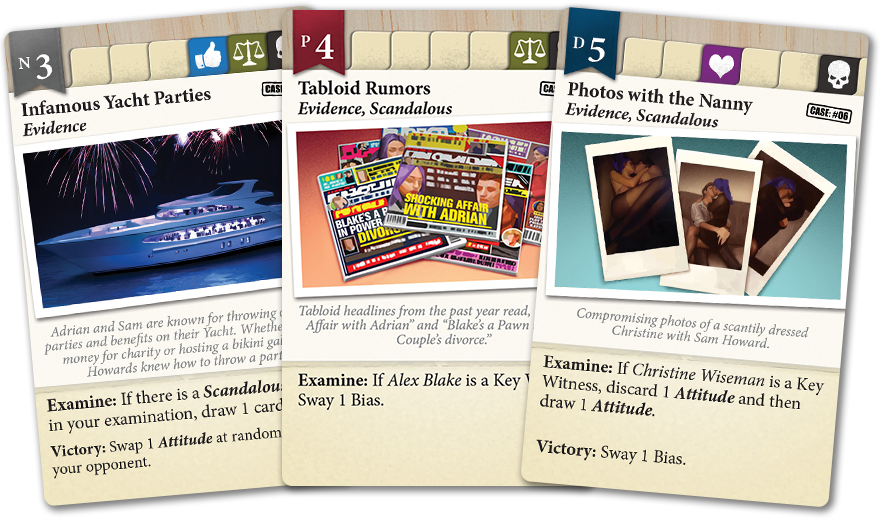
The Divorce case expansion focuses on a high profile celebrity divorce case between a billionaire tech CEO and 90s Television Star. This is a more symmetrical case with each player taking on the role of one of the celebrities of the marriage. You can play as a Sam, the super rich tech CEO or as Adrian, the TV celebrity. Both Sam and Adrian’s cards are dual-sided male/female so you can create any kind of marriage/relationship that you prefer.
One of the new mechanics in this case are secret Attitude cards. Each of these cards represents the emotional state of each partner and matches one of the bias symbols in the game. It’s possible for your attitude to change throughout the course of the divorce proceedings but each one gives you extra victory points for marital assets with the matching bias symbol on them.

The other big change for the Divorce case is that you’ll be fighting over (and swaying) marital asset cards rather than the jury. Each Asset card is double-sided and has an asymmetrical track where you can spend influence to sway bias. The victory point values on each asset are scored by the player who wins the asset (if in their color) but assets can also be shared between players. This allows the Divorce case to be played competitively or cooperatively based on the strategies chosen by each side leading to amicable splits, financial victories, or spiteful losses. Will you compromise for the sake of the children or drag each other through the mud to get the most assets?
Private Eye Case
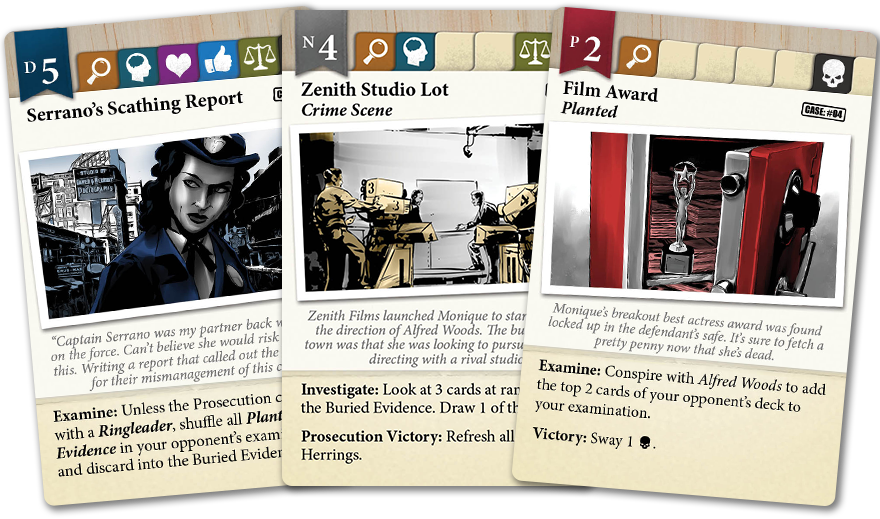
The Private Eye Case expansion sees the defense take on the role of private investigator in a 1950s Hollywood noir setting where they have been framed for the murder of a popular film star. The private eye will need to divide their time between investigating clues to solve the real murder and defending themselves in court. The prosecution works with conspirators and ring leaders to gain red herrings to hinder this investigation.
This case features a lot of new mechanics that shake up the core game. As the defense, you will be working to reveal cards from clue decks to discover WHO murdered the starlet with WHAT weapon WHERE in the city. Like the game Clue, each clue card eliminates one of the possibilities. The dilemma is that in order to investigate and reveal clues, you will need to play evidence cards for their Investigation effect instead of using them in the courtroom to influence the jury. If the Private Eye is able to correctly guess the murderer, weapon and crime scene they will win the game, but they need to make sure that they don’t ignore the trial where the chips are stacked against them.
The prosecution represents a vast conspiracy of witnesses trying to frame the private investigator. Their goal is clearly focused on winning the trial and they will do their best to draft and utilize planted evidence in the courtroom. The prosecution will earn Red Herring tokens as they sway and manipulate the jury which they can place on the clue decks to hinder the PI’s investigation.
Casino Heist Case
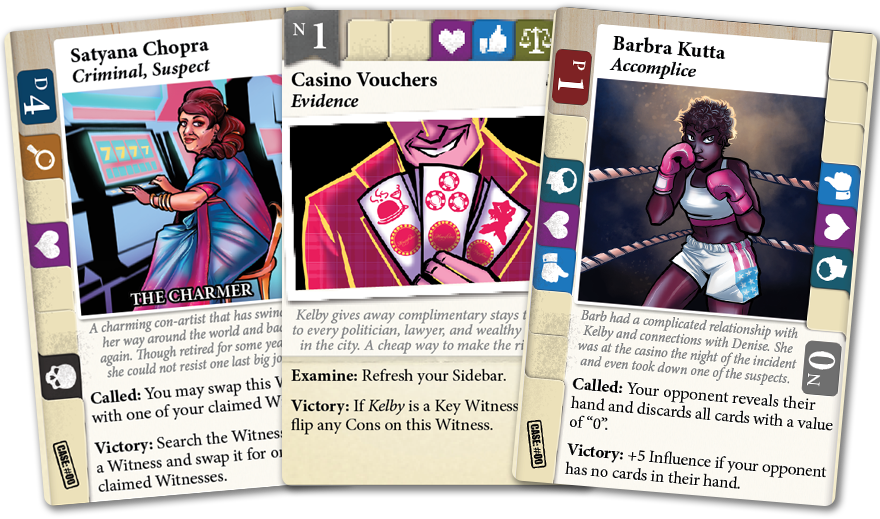
A team of thieves and swindlers have taken the Majestic Casino for all its worth. The suspects were rounded up easy enough, but proving their guilt conclusively will be difficult. The defendants seem overly confident within the court room. Is it just a façade as their scheme crumbles down around them? Or do they have one last trick up their sleeves?
In the Heist case, the prosecution is attempting to convict a majority of the gang responsible for the heist while the defense is doing their best to get as many swindlers exonerated as possible. These defendants are running the long con! Throughout the case they will be dealt double-sided Con cards. Players will be competing to assign these Cons to defendants and flip them to the side that benefits them the most. A defendant’s trial is resolved and scored when they complete their long con and are dealt 3 Con cards. It is essential to deal the final Con to the defendant’s you’re winning to score them. The player who convicts or exonerates the most defendants wins.
Expanded Solo Mode
The Solo Expansion expands on the solo mode in the base game by adding a new solo base deck, a bias die, Automa personality cards, and case-specific card effects that work with every case released thus far. If you’re a player looking to get into the nitty gritty of the rules, read on!
The new Solo Base Deck is shuffled together with the drafted case cards for the Automa. All the effects on these cards have been written with solo play in mind. The Automa’s procedures act like traps that players will have to work around.
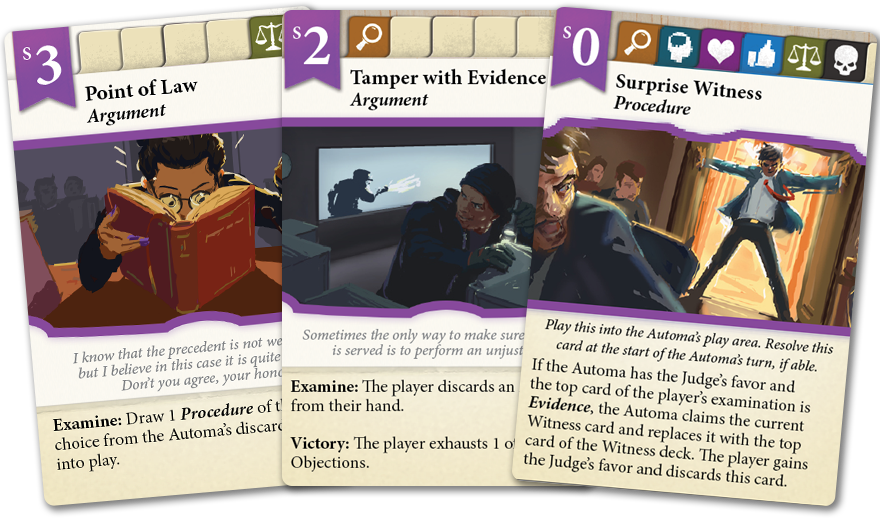
The Automa is further expanded with additional cards that let players build an Automa player. By selecting a Personality card, a Discovery card, and the Questioning card corresponding to the Automa’s role in the selected case, there are tons of unique Automa effects and combinations to explore.
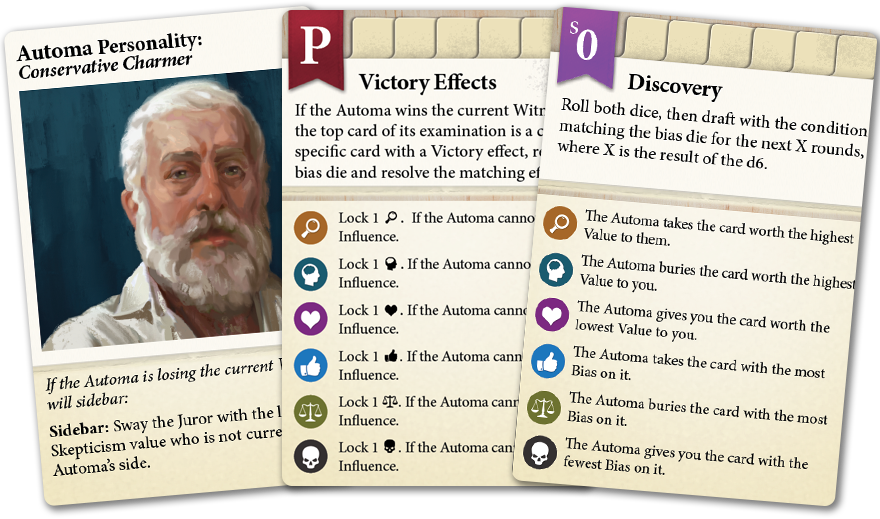
The new Automa rules reduce die rolling and create unique puzzles to work around each witness as players will want to avoid triggering procedures and sidebar abilities that can set them back.

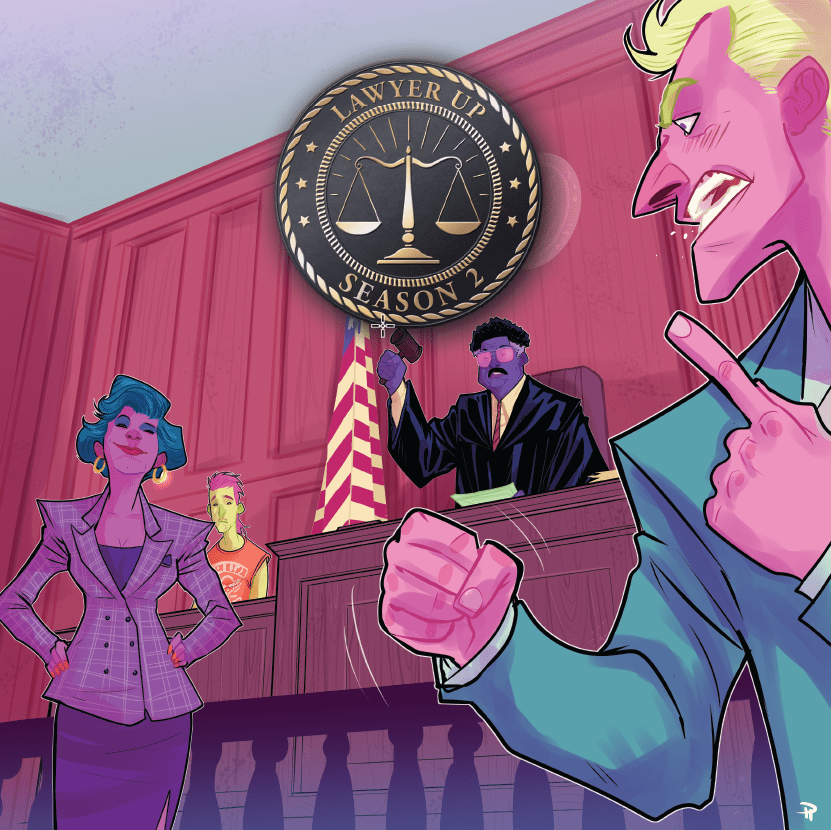

Leave a Reply